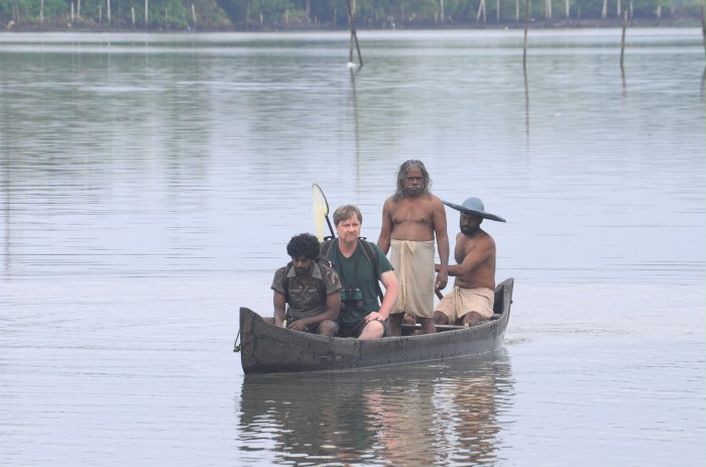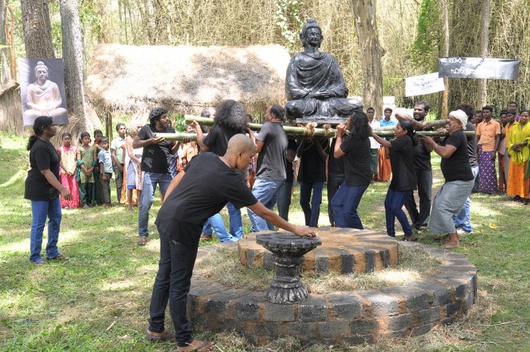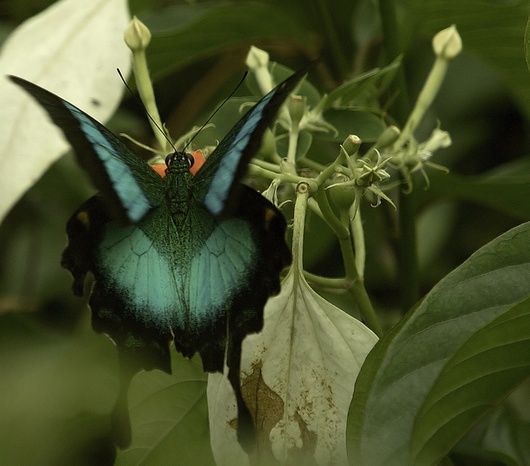
Papilio Buddha: Censorship Made in India
Published on
Translation by:
Lilian PithanIndian cinema isn‘t always flamboyant and colourful: the peculiar case of the drama Papilio Buddha (2013) by Indian director Jayan K. Cherian shows once again that Indian censors proceed with an iron fist and sharp scissors. Gays? Dalits? Maoists? All of these communities are still largely absent from Indian screens. Film review
Cautiously fumbling creepers and pieces of bark, Shankaran (Sreekumar SP) wanders through the subtropical jungle until he almost trips over a dead peacock. With a lot of effort the biologist drags the bird up a promontory, lies down next to it and, covered by its shimmering feathers, finds a short moment of dreamy solace. A little later, Shankaran manages to catch a papilio buddha, an extremely rare butterfly species, which he presents to his American friend Jack (David Briggs). Is this paradise? Decidedly not, as it doesn’t take long for the idyllic early morning fogs over the jungle to be torn apart by brutal reality. In the Hindu social system, Shankaran is a Dalit – an untouchable without caste.
hang out or protest? how to fight for dalit rights
Shankaran’s father Kariyan (ex-Maoist, Dalit rights champion and environmental activist Kallen Pokkoodan) has long been fighting against the brutal treatment of Dalits by officials and higher castes. Manju (Saritha Sunil), a young woman who has opened a primary school for Dalit children on a piece of illegally squatted land, is equally passionate in her fight against ignorance and sexual harassment. Shankaran, however, couldn’t care less: he prefers roaming through the jungle with Jack, dreaming of a new life in America, or hanging out with his naïve NGO friends. But when on another butterfly hunt the biologist and his American friend are arrested by local police, Jack betrays his friend and Shankaran ends up in prison, whisked away by a whirlwind of violence and despotism.
Official trailer of Papilio Buddha (2013) by Indian director Jayan K. Cherian.
Where should Dalits live after they have lost their properties to the greed of international corporations and the destruction of Keralan ecosystems? Why is this part of the population, which after Indian independence in 1947 was technically granted the same rights as all other castes, still suffering heavy reprisals? Why can the police torture Dalit activists without being held accountable? Papilio Buddha (2013), written and directed by Keralan poet Jayan K. Cherian, overflows with inconvenient questions. If you thought that in the 21st century, the “Dalit problem” had long been solved, this début feature film will make you think twice. The cruel fight of the authorities against Dalit activists, portrayed in violent detail in the film, is just as well documented as the expulsion of Dalit communities from rural areas. In relation to the explosive force of these topics, the love story between Shankaran and Jack seems almost inoffensive although homophobia is still rampant in contemporary India.
 Interestingly, the coy love scene between the young Dalit and the American butterfly researcher wasn’t one of the reasons why the Central Board of Film Certification (CBFC) refused to approve Papilio Buddha for Indian audiences. The pundits on the board preferred to find fault with detailed rape and torture scenes, suspected considerable potential for inter-religious conflict and criticized the unseemly vilification of Gandhi. Cherian, however, promptly refused to execute the 25 cuts the board had asked for and it therefore took another eight months for the Film Certification Appellate Tribunal (FCAT) to finally approve Papilio Buddha – albeit in heavily altered form. Gays? Dalits? Maoists? All of them belong to communities that you will rarely see on the glamorous screens of Bollywood. “Although most people don’t know this, there is a strong LGBT movement in India,” says Cherian. “Everyone should be allowed to express their sexuality as freely as Shankaran.”
Interestingly, the coy love scene between the young Dalit and the American butterfly researcher wasn’t one of the reasons why the Central Board of Film Certification (CBFC) refused to approve Papilio Buddha for Indian audiences. The pundits on the board preferred to find fault with detailed rape and torture scenes, suspected considerable potential for inter-religious conflict and criticized the unseemly vilification of Gandhi. Cherian, however, promptly refused to execute the 25 cuts the board had asked for and it therefore took another eight months for the Film Certification Appellate Tribunal (FCAT) to finally approve Papilio Buddha – albeit in heavily altered form. Gays? Dalits? Maoists? All of them belong to communities that you will rarely see on the glamorous screens of Bollywood. “Although most people don’t know this, there is a strong LGBT movement in India,” says Cherian. “Everyone should be allowed to express their sexuality as freely as Shankaran.”
criticizing gandhiji, father of the indian nation
 It is therefore quite bold of Jayan K. Cherian to combine all of these conflictual topics in one and the same film, which makes Papilio Buddha a breathtakingly courageous social statement. Even Gandhi, father figure to the Indian nation, doesn’t escape criticism: “While many celebrate Gandhi as the liberator of the Dalits, others criticize Gandhi’s deep entrenchment in Hindu conservative belief systems. Most Dalit activists follow the teachings of Bhimrao Ramji Ambedkar instead, himself an untouchable who obtained essential rights for the Dalits in the 1940s and 1950s”, Cherian explains. In one of the last scenes of the film, Kariyan and his activists duly burn a makeshift Gandhi effigy before converting to Buddhism and voicing their deep-rooted hatred of all hypocritical “Gandhi peaceniks”.
It is therefore quite bold of Jayan K. Cherian to combine all of these conflictual topics in one and the same film, which makes Papilio Buddha a breathtakingly courageous social statement. Even Gandhi, father figure to the Indian nation, doesn’t escape criticism: “While many celebrate Gandhi as the liberator of the Dalits, others criticize Gandhi’s deep entrenchment in Hindu conservative belief systems. Most Dalit activists follow the teachings of Bhimrao Ramji Ambedkar instead, himself an untouchable who obtained essential rights for the Dalits in the 1940s and 1950s”, Cherian explains. In one of the last scenes of the film, Kariyan and his activists duly burn a makeshift Gandhi effigy before converting to Buddhism and voicing their deep-rooted hatred of all hypocritical “Gandhi peaceniks”.
As in real life, things end quite badly for Shankaran and his comrades-in-arms in Papilio Buddha. Recalling images of the Native American Trail of Tears, the Dalits in the film have to leave their lands after an unsuccessful fight, searching for a new home where they will once again be foreign, ostracised and trampled on. Heavy censoring notwithstanding, Papilio Buddha was awarded four prizes by Keralan cultural institutions with its director’s cut garnering a lot of attention at the 64th Berlin Film Festival. Hopefully, the film won’t only receive critical acclaim, but will equally be able to deploy all of its socially and religiously explosive force in India as well as internationally. In any case, Indian censors will surely have to prepare for a lot more glamorous butterflies in the years to come.
Translated from Papilio Buddha: Filmzensur made in India



